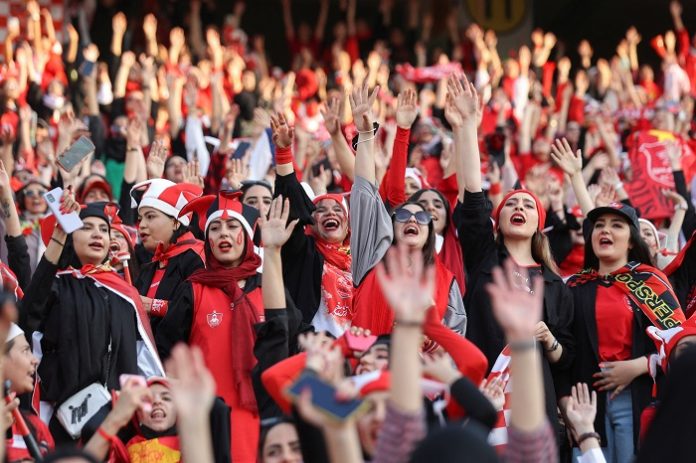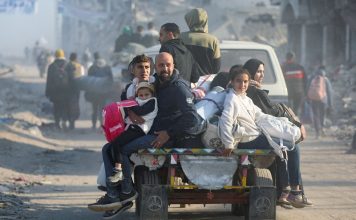
By Kayhan Life Staff
Iran’s National Security Council has granted permission for women to enter certain football stadiums to watch men’s games, according to the head of the Iranian Football Federation.
Iran Football Federation President Mehdi Taj announced on July 9 that the Supreme National Security Council had authorized women to enter stadiums to watch men’s football, and said that a working group had been appointed to decide how to implement this resolution.
According to Taj, the Ministry of Interior, the Ministry of Sports and Youth, the Football Federation and two intelligence agencies will work out the modalities of how women will enter stadiums.
[aesop_image img=”https://kayhanlife.com/wp-content/uploads/2019/03/2018-11-09T084609Z_1_LYNXNPEEA80K0_RTROPTP_4_SPORT-SOCCER-IRAN.jpg” panorama=”off” align=”center” lightbox=”off” captionsrc=”custom” caption=”FILE PHOTO: Iranian women watch the practice session of Iran’s national soccer team from behind the railings as they banned from entering the stadium at Azadi (freedom) sport complex in Tehran, Iran . Reuters ” captionposition=”left” revealfx=”off” overlay_revealfx=”off”]
Taj said women’s “attending and not attending” games in stadiums is no longer an issue, and added: “Women will be present in stadiums such as Gol Gohar, Sepahan, Zob Ahan and Ghadir Ahvaz, which are suitable. Azadi Stadium should also be readied.”
Taj did not provide any further explanations about the two intelligence agencies that are supposed to play a role in planning for women to enter the stadiums. Based on this announcement, there appear to be security and ideological considerations to women watching men’s football in stadiums, and any authorization given by the Iranian authorities seems not to extend to all stadiums.
For years, Iranian women have been attempting to break the ban on entering football stadiums. They have faced numerous incidents and humiliations. In the past years alone, there have been two serious incidents.
One was the self-immolation of Sahar Khodayari, known as “the Blue Girl,” in protest against the ban on women in stadiums, and the other, clashes that broke out at Mashhad Stadium when female ticket holders were faced with pepper spray.
Sahar Khodayari, known as “the Blue Girl” entered Azadi Stadium on Tuesday, March 12, 2019 to watch the match between her favorite team Esteghlal (Taj) and Al Ain, but after being identified by the police officers, she was detained for one night and released on a bail of 500 million Rials. She was sentenced to six months in prison.
EXCLUSIVE- FIFA Officials to Visit Iran After Death of “Blue Girl”
Sahar committed self-immolation in front of the Tehran Prosecutor’s Office in protest against the six-month prison sentence for the crime of “attempting to enter the stadium,” and died at the Motahari Hospital at 4 am on Monday, September 9. The death of Sahar triggered an outpouring of grief in public opinion, especially on social media.
The Iranian authorities’ continued ban on women in football stadiums has sparked reaction from the Federation of International Football Associations, or FIFA.
Five years ago, in a series of letters, FIFA asked the Islamic Republic to allow women to enter stadiums.
Last year, following FIFA pressure, selective and organized permission for women to attend was enabled in several stadiums. But during the Iranian national football team’s last match in the 2022 World Cup qualifiers against Lebanon, held in the city of Mashhad, girls and women who had bought tickets to enter the stadium and watch the game stayed out, and groups of men arbitrarily used pepper spray against them.
The controversies surrounding women in the Iran-Lebanon game in Mashhad were followed by numerous protests, and critics even questioned Iran’s participation in the Qatar World Cup as a result of the scuffles.
The words of the Minister of Interior of the Islamic Republic of Iran in continuing to deny and justify the mistreatment of ticket-holding women eager to watch the Mashhad game were strongly condemned.
Voria Ghafouri, captain of the Esteghlal (Taj) team, said in an Instagram post: “As a football player, I am really ashamed to play in a time when mothers and sisters do not have the right to enter the stadium.”
Mojtaba Jabari, former captain of the Esteghlal Club (Taj) and a national team player, announced on his Instagram page that he would not go to the stadium to watch football until women were allowed to attend matches.
In a statement, Human Rights Watch condemned these events and asked FIFA to immediately demand that the authorities of the Islamic Republic lift the ban on women entering sports stadiums.
As the participation of the Iranian national team in the Qatar World Cup coincided with the beginning of the nationwide protests last year, the Islamic Republic once again banned the selective and partial presence of women in the football stadiums using that pretext.
In April, the Malavan Bandar Anzali Club wrote in an official letter that the infrastructure of the Cyrus Ghayeghran Stadium was suitable for families and women. Yet the Iranian football federation stated that “the presence of women will start from Azadi Stadium and then be implemented in other stadiums with the issuance of guidelines,” thus preventing women from entering the stadium in Anzali.
Government officials have attributed the unpreparedness of sports infrastructure as the reason for banning the presence of women in football stadiums.
As Vice President for Women’s Affairs Ensieh Khazali said: “If the infrastructure is suitable, there is no prohibition, but conditions must be provided so that the value and dignity of women are not undermined.”
Meanwhile, women have consistently and regularly attended religious and government ceremonies held in football stadiums alongside men, and none of the authorities were concerned about the fact that they were not “infrastructure”.
According to the Shargh newspaper, a celebration known as Jashn-e- Mahfeliha was held in Imam Reza Stadium with the enthusiastic attendance of families, and with no concerns about infrastructure. It was not clear why the stadium was off limits for football, the newspaper said, adding: “Is the ‘infrastructure’ in this city, just like Azadi Stadium, only suitable for non-sports programs?”
Iran’s Violence Against Women Runs Deep — And Can No Longer Be Swept Away











